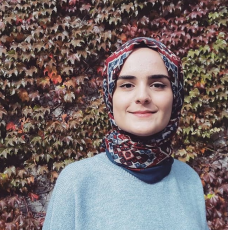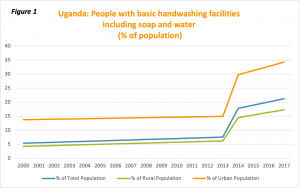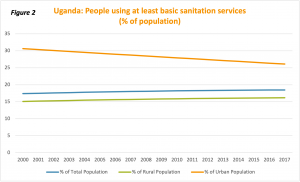I started working for the Advocacy Project as a Peace Fellow the last week. There are a couple of projects I work on. In this blog, I want to discuss why I am super excited to support a soap-making project and the WASH (Water, Sanitation, and Hygiene) Project to install accessible toilets in Uganda. I will provide some data about the accessibility of the water, sanitation, and hygiene services in the region. I am sure the numbers make you surprised and convinced of how vital to work to improve the conditions over there!
First of all, water, sanitation, and hygiene (WASH) are critical to health, survival, and development. Many countries are challenged in providing these services for their entire populations, leaving people at risk for WASH-related diseases. People living in rural areas, urban slums, disaster-prone areas, and low-income countries are the most vulnerable and the most affected.
Water
According to CDC, 785 million people today do not have basic access to water. Finding effective and sustainable solutions for water supplies is significant regarding the fact that 30 to 40 percent of the rural water supply in low-income countries does not work.
Sanitation & Hygiene
Lack of sanitation can be a severe barrier to individual prosperity and sustainable development. Sanitation is essential for all, helping to maintain health and increase life-spans. According to the WHO, an estimated 2.4 billion people lack basic sanitation throughout the world (more than 32% of the world’s population), while 673 million people practice “open defecation.”
Children
The consequences of unsafe water, sanitation, and hygiene on children can be deadly. Many children living in impoverished urban settlements, like slums, are deprived of their drinking water and sanitation rights. UNICEF reported that over 800 children under age five die every day from preventable diarrhea-related diseases due to the lack of appropriate WASH services worldwide. Three billion people worldwide, including hundreds of millions of school-going children, do not have access to handwashing facilities with soap. When children, especially girls, cannot access private and decent sanitation facilities in their schools or learning environments, their right to education is basically restricted. These all have severe implications on their health, nutrition, education, and learning abilities, which prevent a child from achieving his or her full potential.
Africa
According to UNICEF, when it comes to Eastern and Southern Africa, more than 70 percent of the population (340 million people) has no access to essential sanitation services. Among these, 98 million people (19 percent) practice open defecation, 179 million use unimproved facilities, and 63 million shared sanitation facilities. Ethiopia, Uganda, Kenya, and Tanzania have the largest number of people in the region with no access to basic sanitation services. Eritrea, South Sudan, and Ethiopia have the largest proportions and numbers of people practicing open defecation. In schools, over 50 million (27 percent) school-age children have no access to sanitation services, while 117 million (62 percent) have no access to handwashing facilities in schools.
The Trend Over Years
You might think that the percentage of the people who have access to WASH services increases adequately as time passes. Unfortunately, the pace of increase in access to essential sanitation services is quite far away from the UN’s Sustainable Development Goals (SDGs). Access to essential sanitation services in communities has only increased by 6 percent since 2000. There were more people without basic water and sanitation services in 2017 than there were in 2000 in the world!
Uganda
I prepared two charts according to data derived from the World Bank’s DataBank. Charts depict people with basic handwashing facilities and people using at least essential sanitation services in Uganda. Because data is available only for the period between 2000 and 2017, we can track the trend over 17 years.
You can see the percentage of people with basic handwashing facilities, including soap and water, in figure 1. Until 2013, there had been a slight increase in the rate of the population who have access to basic handwashing facilities. Access to handwashing facilities in the total population increased by 6.7 percent in 4 years and reached 21 percent in 2017. However, there is a significant disparity between rural and urban areas. From 2013 to 2017, people with access to handwashing facilities increased by 11% in rural areas; the number reached 19% in urban areas.
Figure 2 shows how urgent working for providing better and sustainable WASH services is essential for essential sanitation services. As you can see from the chart, there has been a slight increase among the total population and urban population who use at least essential sanitation services. Interestingly, the percentage of people having access to sanitation services in urban areas had decreased by 4.2% percent over 17 years! There must have been a constant increase over the years to achieve the UN’s Sustainable Development Goals for Uganda. Rather than seeing a continuous improvement in the region, we face a situation that has been worsened over the years.
This quick introduction and data presented make me super motivated to support the community-based response to one of Uganda’s most pressing problems – the lack of WASH services at primary schools and soap making. Besides, the Advocacy Project’s vision of working directly with local communities, planning the agenda according to local people’s demands, and giving immense importance to their feedback make me more excited. I do believe that the inclusion of local communities in projects is an indispensable part of fostering sustainable development and peace over the region. I will talk more about this in another blog!
Posted By Saliha Gozel
Posted Jun 10th, 2021




4 Comments
Savannah Kopp
June 10, 2021
Super informative! Excited to read more about the project and the progress you will make.
Anna
June 11, 2021
Really interesting! I especially enjoyed learning about the statistics that ground our work. I am wondering why in 2013 basic handwashing facilities increased to such a large degree?
Iain Guest
June 20, 2021
Saliha – you’re off to a great start at AP and this blog shows you’ve gong to be a wonderful resource in the weeks ahead! It’s very well researched and nicely written. No wonder your prof at Georgetown was keen that you join us this summer! As you know, the WASH project may have to be postponed because of COVID, but it will get done and when it does a lot of kids and parents will benefit. There are many ways you can help in the meantime – and we need to identify some allies over here in the US. Let’s also go flat out on your other project – Clean Wash – and see if we can figure out a way to grow it as a business. It, too, promotes WASH! None of this will be easy in this era of COVID, but let’s use our imagination and get it done!
Sarina Maini
June 23, 2021
Very interesting analysis and statistics Saliha! The sharp increase in the handwashing facilities in 2013 and 2014 makes me wonder if there were any policy changes or something that would have led to this. Would you be having any ideas about why it slowed down from 2015 onwards?